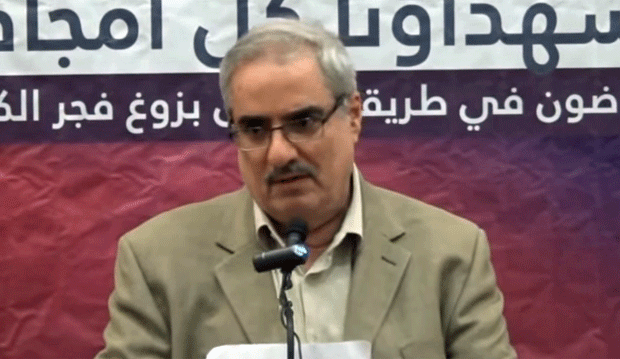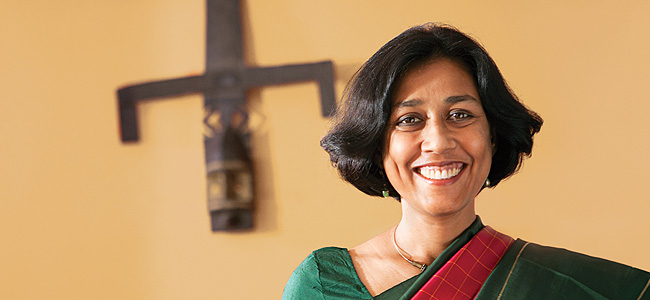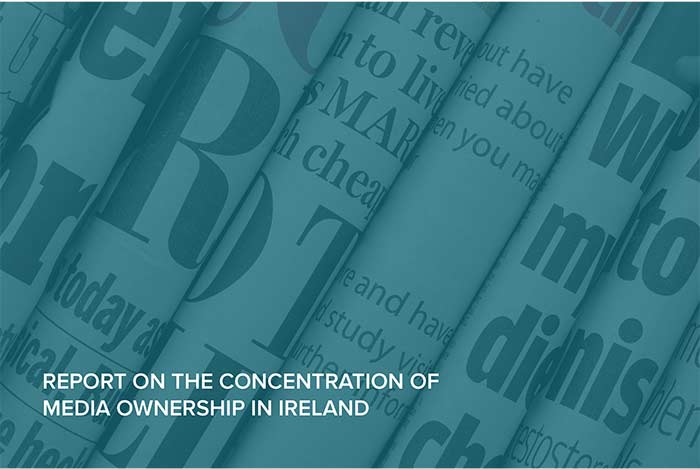15 Nov 2016 | Bahrain, Bahrain Statements, Campaigns, Campaigns -- Featured, Statements
[vc_row][vc_column][vc_column_text]
Bahrain’s public prosecution on Sunday 13 November charged leading opposition politician Ebrahim Sharif under article 165 of the penal code with “inciting hatred against the regime,” after he spoke to the Associated Press last week. We, the undersigned, consider this to be a violation of his right to freedom of expression and a reprisal against his political activity.
The charge carries a three-year sentence and comes after Prince Charles’ controversial visit to the Gulf monarchy last week. It is the latest development in the Bahraini government’s intensified crackdown on civil society in the past year.
Speaking on Prince Charles’ arrival in the country Sharif, the former leader of the secular National Democratic Action Society (Wa’ad), told AP he was afraid the visit would “whitewash” human rights abuses.
Sharif told AP: “I don’t see what’s gone on behind closed doors or whether the prince raised any questions of human rights. Bahrain’s government values its relations with the U.K. and if the U.K. puts its weight behind the improvement of human rights in Bahrain, the government will listen. They need friends.”
He further said: “All parties should compromise. We can’t have absolute power in the hands of the ruling family.”
“Ebrahim Sharif was expressing his opinion and no one should ever be prosecuted for that,” said Sayed Ahmed Alwadaei, Director of Advocacy at the Bahrain Institute for Rights and Democracy (BIRD). “Bahrain claims to be inclusive, that’s the image they tried to sell with Prince Charles’ visit. But Sharif’s prosecution reveals the barefaced lie.”
Prince Charles’ visit courted controversy, with campaigners accusing him of participating in a PR exercise aimed at hiding Bahrain’s poor human rights record. In his visit, the Prince of Wales highlighted religious tolerance in Bahrain, a theme also highlighted by visiting Middle East Minister Tobias Ellwood MP, visiting the Al Fateh Grand Mosque and Bahrain’s Hindu temple, and meeting members of the country’s Jewish community. But the royal tour failed to meet with members of the Shia community, who make up a majority of Bahrain’s citizen population, and who have faced heightened discrimination from the government in the past months. In August, five UN experts called on Bahrain to end its “persecution of Shias”.
Ebrahim Sharif is the former Secretary General of Wa’ad. He was a member of the Bahrain 13, a group of high profile activists arrested, tortured and sentenced by military court in 2011. He was released in June 2015, but re-arrested weeks later and sentenced to another year in prison for a political speech he gave calling for continued peaceful opposition. Sharif was released from prison in July 2016. He is currently under a travel ban order.
At the time of Sharif’s June 2015 release, the US State Department lifted an arms ban on Bahrain, citing “meaningful progress on human rights.” However, Bahrain’s Ministry of Interior re-arrested him less than three weeks later on charges of “inciting regime change and hatred and contempt against the regime.” A court found him guilty and sentenced him to one year in prison. As a result of the deteriorating human rights situation in the country, including Sharif’s re-arrest, both the US Senate and House of Representatives introduced bipartisan legislation calling for the resumption of an arms ban on the Bahrain Defense Force (BDF) and National Guard, forbidding the sale of weapons that could be used to suppress peaceful dissent. The bills would allow for the sale of arms only after the Secretary of State certifies that the Bahraini government has fully implemented all 26 recommendations made by the Bahrain Independent Commission of Inquiry (BICI) in 2011. As of 2016, the US State Department assessed that key recommendations of the BICI still have yet to be implemented by the Bahraini government and, Americans for Democracy & Human Rights in Bahrain (ADHRB), the Bahrain Center for Human Rights (BCHR), and BIRD have found that only two of the Commission’s recommendations have been fully implemented.
“Though the Bahraini government continues to falsely claim that it has implemented all 26 BICI recommendations, virtually all independent assessments reveal a complete failure to reform on key human rights issues,”said Husain Abdulla, Executive Director of ADHRB. “The prosecution of Ebrahim Sharif for his interview with AP follows the authorities’ decision to similarly charge prominent human rights defender and BCHR president Nabeel Rajab for his open letter in the New York Times. These actions clearly demonstrate that the government remains committed to suppressing all forms of criticism.”
The Government of Bahrain’s actions violate the freedom of expression, as protected under Article 19 of both the Universal Declaration of Human Rights and the International Covenant on Civil and Political Rights, which Bahrain acceded to in 2006.
We condemn this violation of the right to free expression and call for the immediate dropping of all charges against Ebrahim Sharif, and all other persons prosecuted for their speech.
Signed,
Americans for Democracy & Human Rights in Bahrain (ADHRB)
Bahrain Center for Human Rights (BCHR)
Bahrain Institute for Rights and Democracy (BIRD)
European Centre for Democracy and Human Rights (ECDHR)
Index on Censorship[/vc_column_text][/vc_column][/vc_row][vc_row][vc_column][vc_basic_grid post_type=”post” max_items=”4″ element_width=”6″ grid_id=”vc_gid:1479198588631-d2e752f2-c2f3-0″ taxonomies=”7706″][/vc_column][/vc_row]
14 Nov 2016 | India, News and features
[vc_row][vc_column][vc_column_text]

Eminent sociologist Nandini Sundar, who won the prestigious Infosys Prize for social science in 2010, stands accused of murder in the death of a villager in a region she has studied intensely since 1990.
Two Indian social scientists are among 10 people charged with murder in Chhattisgarh, an Indian state wracked by an ongoing insurgency by Maoist rebels that the academics were actively studying.
Neither Nandini Sundar, an eminent sociologist at Delhi University, nor Archana Presad, a labour historian at Jawaharlal Nehru University, are specifically charged with wielding the weapons that killed villager Shamnath Baghel on 4 November. Instead, the charges filed after a complaint by the wife of the victim suggest that they were complicit in the attack. Sundar has called the complaint, known as first information report, or FIR, “patently absurd”.
“This is a vendetta against all researchers, journalists, lawyers and activists who are willing to expose complete lawlessness of police,” she said, adding that she condemns the killing of the villager.
A large number of Indian and global sociologists have condemned the arrest specifically and the stifling of freedoms of expression and academic inquiry more broadly in India. More than 180 Indian sociologists and more than 30 from outside India signed a statement critical of the arrest. “As sociologists we are forced to condemn the growing nation-wide trend towards the stifling of all voices of dissent from academia, the media and cultural and literary practitioners. Disabling independent research and silencing contrary views undermines the collective ability to build a better future.”
Their statement cited other recent instances: “We note with concern the increasing incidents of attempts to intimidate or falsely accuse members of our profession, be it Prof. Vivek Kumar in Gwalior, Prof. Rajesh Mishra in Lucknow or Prof. M.N. Panini in Jharkhand.”
Baghel was killed, allegedly by Maoist rebels (known as Naxalites), after protesting insurgent activities in the Sukma district of south Chhattisgarh. Baghel and others had started their movement in April, and in May had filed his own complaint against Sundar, Prasad, Vineet Tiwari from the NGO Joshi Adhikar Sansthan, the Communist party’s local state secretary Sanjay Parate and several reputed Maoists for the group’s alleged encouragement of Maoist activities. “According to villagers,” Inspector General of Police SRP Kalluri told the Indian wire service PTI, “Sundar and others went in the village to allegedly threaten them not to oppose the Maoists”. The specific charges are for conspiracy, murder and rioting.
Hostility between academics and the authorities is nothing new.
Sundar’s wide-ranging scholarship has included detailed studies of Chhattisgarh, most recently in a book, The Burning Forest: India’s War in Bastar, released in September. As eSocialSciences described it, “The book is a product of painstaking research and is a vivid account of the human rights abuses by the Maoists and the government and the absence of justice” drawn from Sundar’s 25 years studying the area.
In 2011 Sundar successfully petitioned India’s Supreme Court to disband a state-backed militia known as Salwa Judum that was battling the Maoists. Kalluri was active in directing those “special police officers” and Sundar believes the criminal charges come as “a direct fall-out” from accusing Kalluri for being responsible for violence committed during that period.
“How can we be charged with murder and rioting when we are not even there?” Sundar said in a statement. “This is clearly part of IG Kalluri’s attempt to intimidate and harass journalists, lawyers, researchers, political leaders and human rights activists who have exposed the reign of fake encounters, gang rapes etc. that are going on in Bastar.”
Kalluri, for his part, has linked Sundar directly with the Maoists, saying she was part of a delegation of Maoists that “roamed freely” throughout Bastar in May and threatened villagers trying to defend themselves. “We don’t mind anyone supporting some ideology, but they should not incite innocent tribals to rebel against the state,” Kalluiri said, referring to the indigenous Bastari. “There is sufficient background, there is a prelude, correspondence and evidence.” The complaint, according to an article in The Hindu, includes claims that “Maoists kept telling Baghel that he was being punished because he did not listen to Ms. Sundar and others, and continued opposing them”.
Sundar said the May trip was a fact-finding expedition looking at brutality from all sides. She issued a press release detailing the delegation’s findings, which seems at odds with Kalluri’s claims that Sundar was using a false name.
The authorities were monitoring Bastar had Sundar before this killing. Last month, the police and security forces in Chhattisgarh burnt effigies of Sundar alongside those of activists, writers and a journalist. After Sundar’s arrest, Kullari told NDTV that “activists are enemies because they incite the people of India”.
Historian Ramchandra Guha tweeted: “This vicious and vindictive FIR proves beyond doubt that Chhattisgarh is a police state.”
This article was originally posted at Social Science Space[/vc_column_text][/vc_column][/vc_row][vc_row][vc_column][vc_basic_grid post_type=”post” max_items=”1″ element_width=”12″ grid_id=”vc_gid:1479304327691-d6a06326-a312-6″ taxonomies=”8952″][/vc_column][/vc_row]
11 Nov 2016 | Mapping Media Freedom, News and features
[vc_row][vc_column][vc_column_text] Each week, Index on Censorship’s Mapping Media Freedom project verifies threats, violations and limitations faced by the media throughout the European Union and neighbouring countries. Here are five recent reports that give us cause for concern.
Each week, Index on Censorship’s Mapping Media Freedom project verifies threats, violations and limitations faced by the media throughout the European Union and neighbouring countries. Here are five recent reports that give us cause for concern.
Turkey’s main internet regulator, Information and Communication Technologies, sent instructions to operators to close VPN services, according to technology news site Webtekno.
The ICT said it was acting within the scope of Article 6, paragraph 2 of law no 5651 in adopting a decision requesting Turkish operators to shut down VPN services.
The decision covers popular encryption services as Tor Project, VPN Master, Hotspot Shield VPN, Psiphon, Zenmate VPN, TunnelBear, Zero VPN, VyprVPN, Private Internet Access VPN, Espress VPN, IPVanish VPN.
According to Webtekno some VPN services are still available such as Open VPN.
“This is clearly detrimental to journalists and the protection of their sources,” Hannah Machlin, project officer for Mapping Media Freedom, said.
Turkey’s internet censorship did not stop with VPNs as the country faced a shutdown of the popular social media sites Facebook, YouTube, Twitter and more. This was the first time in recent years that the Turkish government targeted popular messaging apps such as WhatsApp, Skype and Instagram, according to Turkey Blocks.
The Independent states that it’s unclear whether the social media outage came from an intentional ban, an accident or a cyber attack. Turkey Blocks believes the outage was related to the arrest of political activists for the opposition party the previous night.
Turkey has increasingly utilised internet restrictions to limit media coverage in times of political unrest.
Spanish group Morera and Vallejo, has decided to slash contracts with photographers working for their newspaper, El Correo de Andalucía, according to the Sevilla Press Association (APS).
The three photographers working as “fake” freelancers for the newspaper were on a permanent contract without the benefits of being an employee. New contracts for the photographers worsened their conditions, lowering their pay and lessening the work photographers can put in daily.
APS additionally states that journalists working for El Correo de Andalucía are expected to act as photographers as well, doubling the amount of work they must put in. The newspaper pushed for the merging journalism and photography but journalists are unwilling to steal their coworkers’ jobs.
Four journalists from the Center for Investigative Reporting in Serbia (CINS) have noted that they have been followed and photographed on mobile phones by unknown individuals, NUNs Press reported.
CINS, which is known for reporting on corruption and organised crime in Serbia, believes the stalkers are an attempt to intimidate their journalists. Editor-in-chief Dino Jahic stated that they’re unsure who is behind the harassment, “We are working on dozens of investigations all the time, and each of them could trigger somebody’s anger.”
On its website, CINS wrote that they were determined to continue their investigations despite the intimidation. Their case has been reported to the Ministry of Interior and the public prosecutor’s office in Belgrade.
The online investigative news site Ukrayinska Pravda has reported that Ukrainian authorities wiretapped the outlet’s offices during the summer of 2015.
Editor-in-chief Sevgil Musayeva-Borovyk said in March of 2016, an unidentified person handed in an envelope with operational reports, activities and topics recently discussed by UP. The site has no evidence that wiretapping has continued since then.
According to Ukrayinska Pravda, the security service of Ukraine was carrying out orders from the president’s administration. Ukrayinska Pravda reported that it was not only its journalists that were targeted, claiming the staff of several other media sites have been tapped. Mapping Media Freedom does not yet know which other organisations.
Journalists have asked the security service of Ukraine, interior minister and chairman of the national police to respond to the information UP has gathered.[/vc_column_text][/vc_column][/vc_row][vc_row][vc_column][vc_column_text]
Click on the bubbles to view reports or double-click to zoom in on specific regions. The full site can be accessed at https://mappingmediafreedom.org/
[/vc_column_text][vc_basic_grid post_type=”post” max_items=”4″ element_width=”6″ grid_id=”vc_gid:1478786551399-adbbd256-7b8d-7″ taxonomies=”6564″][/vc_column][/vc_row]
10 Nov 2016 | Ireland, Mapping Media Freedom, News and features
[vc_row][vc_column][vc_column_text]
The Republic of Ireland has seen a steady decline in media plurality, according to the authors of a new report.
The recent Report on the Concentration of Media Ownership in Ireland, published on 19 October, concludes that the country has one of the most concentrated media markets, with wealthy media owners possessing the influence to skew the news report for personal gain. According to the report the The authors — Caoilionn Gallagher and Jonathan Price at Doughty Street Chambers, Gavin Booth and Darragh Mackin at KRW Law, and commissioned by Lynn Boylan MEP– drew on a variety of studies to compile the report including research from the Centre for Media Pluralism and Media Freedom’s Media Pluralism Monitor (2015). Based on the source material, the report examined how diversity in viewpoints and opinions are reflected in a nation’s media content.
CMPF created a Media Pluralism Monitor to measure whether a country is a “high risk territory” on a scale of 0% to 100%, with “high risk” countries falling at 74% or above. Researchers based in the 19 countries covered by the monitor collect data points that include protection of journalists, number of media outlets, political independence and social inclusiveness among other indicators.
In 2015 Dr. Roderick Flynn, of Dublin City University, generated a report on Ireland for CMPF’s Media Pluralism Monitor which found there was a “medium risk” (54%) of market plurality, and specifically “very high risk” (74%) in relation to the “concentration of media ownership”. Based on Flynn’s research it was concluded that, largely, the media concentration stemmed from businessman Denis O’Brien, founder of Communicorp, owner of a significant minority stake in Independent News and Media and a large portion of the commercial radio sector. The October report called O’Brien’s ownership and influence in media outlets a concern. Additionally, Doughty Street Chambers and KRW Law highlighted the Irish defamation law as a key issue “which threatens news plurality and undermines the media’s ability to perform its watchdog function”.
Though Flynn’s study and the Doughty Street Chambers and KRW Law report clearly point out significant issues, which have been further discussed with organisations such as the National Union of Journalists and the EU Commission, it also proposes ideas for revisions. The report states the “firm view that there must be detailed multi-disciplinary analysis and careful consideration before any steps are taken”. The authors of the report suggest that the Irish should “establish a cross-disciplinary commission of inquiry”, which would “examine the issues closely and make concrete recommendations.” Additionally the authors ask the Council of European Committee of Experts on Media Pluralism and Transparency of Media Ownership to work within the parameters of the European Convention on Human Rights (ECHR), a treaty that “the right to [business] property is heavily caveated under”. Consequently, by utilising the ECHR, the committee could spur a decrease in the media power of business moguls such as Denis O’Brien. Along with further modifications, the study indicates that these alterations are necessary to maintain media plurality in Ireland.[/vc_column_text][/vc_column][/vc_row][vc_row][vc_column][vc_basic_grid post_type=”post” max_items=”4″ element_width=”6″ grid_id=”vc_gid:1479382383515-ed0923d1-1fb7-1″ taxonomies=”76″][/vc_column][/vc_row]



 Each week, Index on Censorship’s
Each week, Index on Censorship’s 